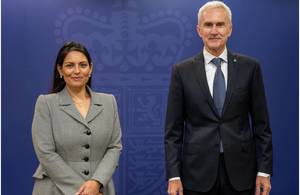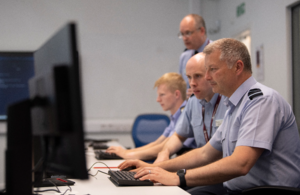PARAGRAPH 8 OF THE MINISTERIAL DECISION ON THE TRIPS AGREEMENT ADOPTED ON 17 JUNE 2022
Thank you, Chair.
The UK would like to thank you and the Secretariat for navigating the TRIPS Council through a complex negotiating process during MC12. While the process for reaching the consensus-based TRIPS Decision was by no means perfect, and lessons could be learned, your leadership and guidance was valuable in helping us reach an outcome and will no doubt be required moving forward. We also extend our gratitude to all Members for their cooperation and patience throughout the process.
The UK has listened carefully and understood concerns raised by developing countries, particularly those regarding use of the compulsory licensing system. Bearing such feedback in mind, the UK engaged constructively in discussions on how compulsory licensing could help developing countries to achieve their public health policy objective of accessing COVID-19 vaccines.
After a series of intense negotiations, we understand the aim of this Decision is to make it easier for eligible Members, who choose to do so, to make exports of life-saving COVID-19 vaccines more streamlined, while preserving incentives to invest in innovation embedded in IP rights.
The UK will engage constructively and in good faith, being guided by evidence and noting the distinction between vaccines, therapeutics, and diagnostics. We welcome all Members’ views and the opportunity to engage bilaterally on the matter.
We are pleased to see the IP framework has been put in use by licensing partnerships for COVID-19 treatments underway, including via the Medicines Patent Pool.
Chair, we also thank delegations for the unofficial room document RD/IP/49 circulated today. This text will certainly form part of our analysis of the matter. Given the complexities of therapeutics and diagnostics, we will use the time available, and we call on others to do the same, to gather and analyse evidence and engage bilaterally during the summer months, so that we are able to deliver on the mandate via multilateral evidence-based discussions after the summer. We see the TRIPS Council, with you, Chair, at the helm, as the right forum to hold these discussions.
Thank you, Chair.
INTELLECTUAL PROPERTY AND INNOVATION: IP LICENSING OPPORTUNITIES
Thank you Chair,
We would like to thank the US for drafting and presenting this paper, and share some of the UK’s experience in this area.
Firstly, on the kinds of licensing that are possible in the UK for each right:
In essence – a licence is an agreement between the IP right owner and another party. It grants them permission to do something that would be an infringement of the rights without the licence.
IP can be “licensed-out” or “licensed-in”. The rights owner can “license-out” to another company in return for a fee. A business can “license-in” if it wants to use another company’s IP to develop its own business and products. In the UK, licences can be for patents, trade marks, designs and copyright as well as trade secrets/know how. Any licence arrangement, including any financial element, is made directly between the licensee and the right owner.
In the case of patents, the patent holder can request that the patent be endorsed with a “licence of right” in the register. This means that the owner must grant a licence to anyone who wants one.
The licence will still be an ordinary, commercial licence and the terms and fees will be a private matter between the licensee and licensor. The main advantages of having a patent endorsed with a licence of right is that it lets other people know that the owner is willing to licence the patent. Annual renewal fees are also reduced to half the usual cost if the patent is endorsed with a licence of right.
Though notifying the UK Intellectual Property Office of the grant or assignment of a licence for patents is not mandatory, it is recommended and will be recorded in the patents register.
Trade marks can also be licensed by the owner to give a licensee permission to use their registered mark. This can form part of a wider commercial arrangement, such as a franchise agreement. The terms of the licence are also between the licensee and the licensor, for example if the licence is exclusive, so the mark cannot be used by anyone else, including the registered owner, or limited to a particular geographical area.
Again – notifying the UK Intellectual Property Office of the grant or assignment of a licence for a trade mark is not mandatory, but is recommended and will be recorded in the trade mark register.
A design owner can give someone else permission to use their registered design by granting them a licence, and in this instance, notifying of the grant or assignment of a licence for registered designs is required and will be recorded in the designs register.
Licences can also be granted for unregistered designs. In addition to usual licensing arrangements, a licence of right must be made available to third parties in the last 5 years of the term of protection for a UK unregistered design right.
A copyright owner may decide whether and how to license use of their work, and any licence agreed can relate to one or more of the rights granted by copyright, and can also be limited in time, geographical extent or any other way. An exclusive licence can also be granted, which enables the licensee to use the copyright work in the manner specified by the licence to the exclusion of all others, including the copyright owner. Notably, licensing may be carried out by direct negotiation, or through agents or collective management organisations (CMOs).
A copyright owner may also prefer to allow limited access to, and use of, their work without charge – and one way to do this is by using a Creative Commons Licence.
In instances where a copyright owner is unknown or cannot be found, individuals or businesses may apply to the UK Intellectual Property Office for an “orphan works” licence. Subject to completion of a diligent search, and payment of appropriate fees, such a licence will be limited to the UK for a maximum length of seven years and will be non-exclusive. The paid licence fees are retained for eight years in case the right holder comes forward.
We would also like to note that the UK is also considering IP licensing as part of its Futures Programme, to anticipate potential evolution in the kinds of IP licensing that may occur due to emerging technologies and new business models.
The UK would also like to briefly look at the benefits of IP licensing:
When a company licenses the right to manufacture and sell products. the costs and risks are shared between the licensor and the licensee. The licensor will receive revenue from licensing but will not take the risk of manufacturing, promoting, or selling the licensed products. The licensee will have the right to use the IP without incurring the expense and risk of undertaking research, or the cost of developing the product.
Some of the potential benefits to the licensor will include increasing revenue by broadening the reach of IP into different markets. Market penetration would be increased by licensing another business to sell in territories that the owner cannot cover.
Though exceptions and limitations exist within the IP framework, a licence usually provides a higher degree of business certainty than relying on an exception.
The potential benefits to a licensee include reducing research and development costs by ‘licensing-in’ innovation. By taking a licence, a business may tap into expertise that it does not have in-house. A business may save time and get its products or services to market more quickly by acquiring a licence to use existing IP, rather than starting from scratch. Acquiring a licence to use existing IP may help a business obtain a competitive advantage over its competitors.
So, both licensors and licensees can benefit from collaboration to develop new products and services, creating a highly beneficial partnership.
I hope that these highlights from how licencing of IP works in the UK have been of interest to members, and I would like to again thank the US for their paper on this topic.
Thank you, Chair.



